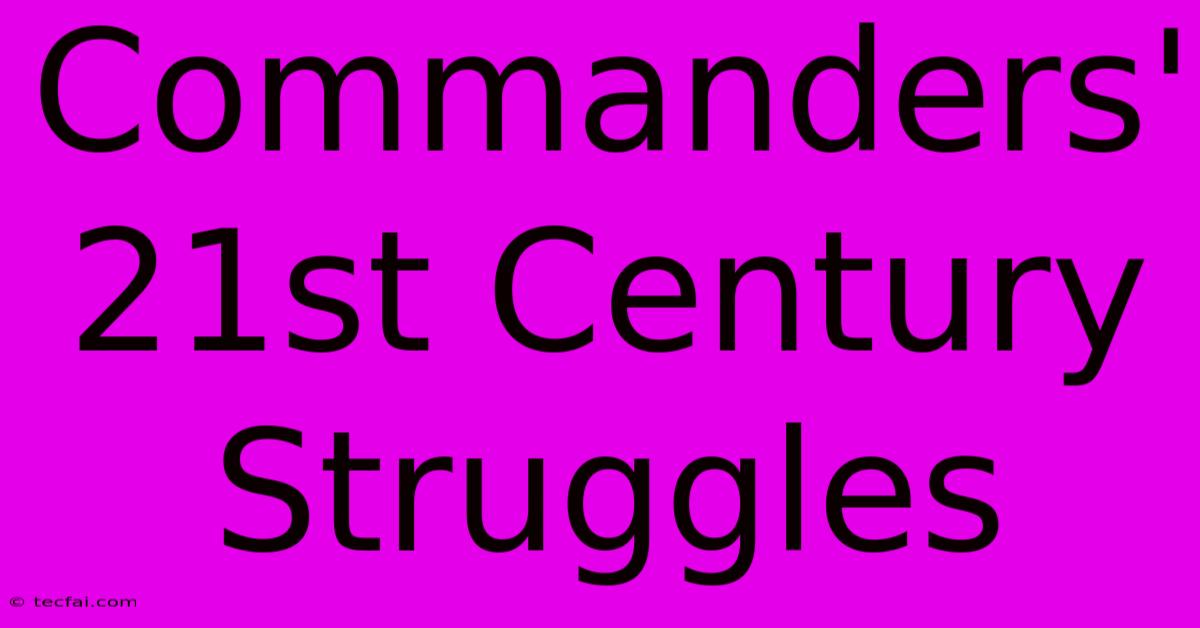Commanders' 21st Century Struggles

Discover more detailed and exciting information on our website. Click the link below to start your adventure: Visit Best Website tecfai.com. Don't miss out!
Table of Contents
Commanders' 21st Century Struggles: Navigating a Complex Battlefield
The 21st-century battlefield is vastly different from those of previous eras. Commanders today face a complex web of challenges that extend far beyond traditional military concerns. This article explores the key struggles facing commanders in the modern era, examining the evolving nature of warfare and the leadership skills required to navigate this turbulent landscape.
The Evolving Nature of Warfare
The defining characteristic of 21st-century warfare is its hybrid nature. Gone are the days of clear-cut battles between nation-states. Instead, commanders must contend with:
Asymmetric Warfare:
This involves conflicts between belligerents with vastly different capabilities, often utilizing unconventional tactics. Insurgencies, terrorism, and cyber warfare fall under this umbrella. Commanders must adapt their strategies to address these non-traditional threats, often requiring a shift in mindset from large-scale operations to smaller, more agile responses. This requires enhanced intelligence gathering and a deep understanding of the cultural and political context of the conflict.
Information Warfare:
The battle for hearts and minds is arguably as important as physical combat. Propaganda, disinformation campaigns, and the manipulation of social media are powerful weapons. Commanders must develop strategies to counter these narratives and maintain control over information flows, both within their own forces and within the broader public sphere. This requires sophisticated media literacy and the ability to effectively communicate with diverse audiences.
Technological Disruption:
Rapid technological advancements continue to reshape the battlefield. Drones, artificial intelligence, cyber weapons, and advanced surveillance systems are transforming the way wars are fought. Commanders must not only understand these technologies but also possess the foresight to anticipate their future applications and adapt their strategies accordingly. This calls for continuous professional development and a willingness to embrace innovation.
The Leadership Challenges
The complexities of modern warfare demand a new breed of commander. Successful leadership in the 21st century requires:
Adaptability and Resilience:
The ability to adapt to rapidly changing circumstances and bounce back from setbacks is crucial. Commanders must be comfortable operating in ambiguous environments and making decisions with incomplete information. This necessitates a high level of emotional intelligence and a capacity for decisive action under pressure.
Ethical Decision-Making:
Modern warfare often involves navigating complex ethical dilemmas, particularly concerning the use of technology and the protection of civilian populations. Commanders must uphold the highest ethical standards while making difficult choices under pressure. Strong moral character and a commitment to accountability are paramount.
Collaboration and Communication:
Effective communication and collaboration are essential for coordinating operations across multiple domains and with diverse actors. Commanders must foster trust and teamwork within their units and build strong relationships with allies and other stakeholders. This demands strong interpersonal skills and a clear understanding of cross-cultural dynamics.
Conclusion: The Future of Command
The 21st century presents unprecedented challenges for military commanders. Success requires a sophisticated understanding of the evolving nature of warfare and the development of strong leadership skills focused on adaptability, ethical decision-making, and effective communication. Commanders who can master these skills will be best positioned to lead their forces effectively in this increasingly complex and unpredictable world. The future of warfare hinges on the ability of commanders to not only adapt to these challenges, but to innovate and anticipate the next evolution of conflict. This will necessitate a continued focus on education, training, and the development of agile and resilient leadership across the armed forces globally.

Thank you for visiting our website wich cover about Commanders' 21st Century Struggles. We hope the information provided has been useful to you. Feel free to contact us if you have any questions or need further assistance. See you next time and dont miss to bookmark.
Featured Posts
-
Jamaica Vs Usmnt Usa Wins First Leg
Nov 15, 2024
-
Pedro Pascals Sweet Sisterly Moment Goes Viral
Nov 15, 2024
-
How Sap Drives Roca Groups Success
Nov 15, 2024
-
Infowars Sold The Onion Takes Over Jones Outraged
Nov 15, 2024
-
King Charles Aids Food Poverty Project
Nov 15, 2024
